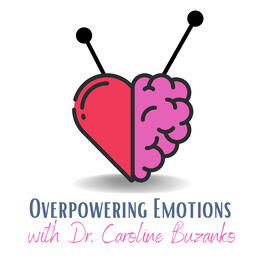
204. What’s the difference between emotions, feelings, affect, and moods? (And why does it matter?)
Emotions aren’t just “big feelings” — they’re information. In this episode of Overpowering Emotions Dr. Caroline breaks down the building blocks of affect, emotions, feelings, and moods to show why understanding the differences matters for kids’ self-regulation. Learn how the brain interprets emotional signals, why emotions guide survival and decision-making, and how pleasant and unpleasant emotions both play a role in resilience. You’ll walk away with a clearer map for helping children (and yourself) move from overwhelmed to informed by emotional experiences. Homework Ideas Boosting Pleasant Moods Journal: Each day, have kids write or draw one moment of pleasant emotions. Talk about how it gave them energy for learning or connecting. Behaviour vs Emotion Reflection: When a child engages in a behaviour, separate it from emotion: “It makes sense your body wanted to slam the door when you were angry. Anger’s job is to protect. Let’s find another way to do that.” Brain Mapping: Help kids recognize the connections between thoughts, emotions, and behaviours, and show how their brain can be “rewired” to respond differently over time.Draw (or print) a simple brain with two key parts labeled:Amygdala = “Alarm System” (sometimes right, sometimes glitchy)Prefrontal Cortex = “Wise Coach” (helps calm the alarm with reason and practice) Explain: “When something scary or stressful happens, the amygdala sets off the alarm before you even think. Your prefrontal cortex can calm it down—but only if you practice sending it the right messages. We’re going to map how your brain reacts, and then practice rewiring it.” Map a Real-Life Situation: On a piece of paper, draw four columns:Trigger / Situation (“What happened? What set off the alarm?”)Thoughts (“What was running through your mind?”)Feelings / Body Signals (“What did your body do?” Racing heart? Sweaty palms? Stomach ache?)Actions / Behaviors (“What did you do next? Did you avoid, yell, freeze, or something else?”) Have kids fill them in whenever they experienced strong emotions. Guide with prompts like: “When did your amygdala set off the alarm this week?” Connect the dots:Show how actions (like avoidance) may have made the amygdala stronger (“see, I was right, that was dangerous!”).Show how helpful actions (like staying in the situation, using calming skills, or reframing a thought) send the opposite message (“actually, this wasn’t dangerous, I can handle it”).Draw arrows to make a cycle diagram: Trigger → Thoughts → Feelings → Actions → Amygdala ResponseAsk: “Did your brain get tricked into making the cycle worse, or did your brain start learning it could handle it?”Practice rewiring the brain: For each mapped example, add a new column called: “Rewire Response” (What could I think, feel, or do differently next time to help my brain learn I can handle it?)Examples:Thought: “This is panic, but I can ride it out.”Action: “Instead of leaving, I’ll stay one more minute.”Feeling: “I might still feel scared, but it doesn’t mean I’m in danger.”Reflect & Track Progress: At the end of the week, ask:“When did your prefrontal cortex win this week?”“What did your amygdala learn?”“What cycle do you want to rewire next?” Enjoying the show? Help out by rating this podcast on Apple to help others get access to this information too! apple.co/3ysFijh Follow Dr. Caroline YouTube: https://www.youtube.com/@dr.carolinebuzanko IG: https://www.instagram.com/dr.carolinebuzanko/ LinkedIn: https://ca.linkedin.com/in/dr-caroline-buzanko Facebook: https://www.facebook.com/DrCarolineBuzanko/ X: https://x.com/drcarolinebuz Website: https://drcarolinebuzanko.com/ Resources: https://drcarolinebuzanko.com/#resources Business inquiries: https://korupsychology.ca/contact-us/ Want to learn more about helping kids strengthen their emotion regulation skills and problem-solving brains while boosting their confidence, independence, and resilience? Check out my many training opportunities! https://drcarolinebuzanko.com/upcoming-events/
From "Overpowering Emotions Podcast: Helping Children and Teens Manage Big Feels"


Comments
Add comment Feedback